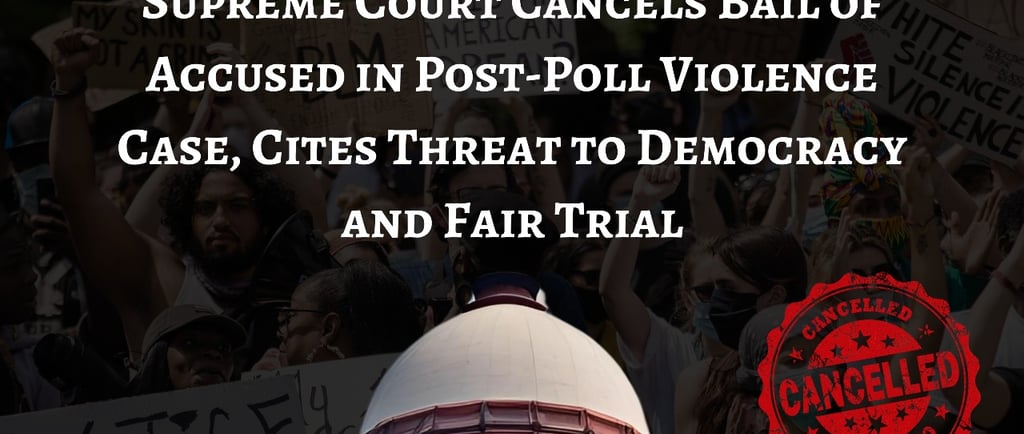Supreme Court Cancels Bail of Accused in Post-Poll Violence Case, Cites Threat to Democracy and Fair Trial
New Delhi, May 29, 2025 — In a significant ruling on Thursday, the Supreme Court of India cancelled the bail granted to multiple accused in a gruesome post-poll violence case from West Bengal, observing that the incident represented “a grave attack on the roots of democracy” and that allowing the accused to remain free would imperil the fairness of the trial.
5/31/20253 min read


A Division Bench comprising Justices Vikram Nath and Sandeep Mehta pronounced the verdict while allowing Criminal Appeals No. 2880 and 2881 of 2025, arising from Special Leave Petitions filed by the Central Bureau of Investigation (CBI) challenging the Calcutta High Court’s bail orders dated January 24 and April 13, 2023.
The Case: Post-Election Violence and Alleged Assault
The incident that sparked the litigation dates back to May 2, 2021, immediately following the declaration of the West Bengal Assembly election results. The complainant, a resident of Gumsima village in the Jatra post office region and a supporter of the Bharatiya Janata Party (BJP), alleged that a mob of 40 to 50 individuals, led by a ruling party leader Sekh Mahim, attacked his home in retaliation for his political affiliation.
According to the First Information Report (FIR), the mob was heavily armed with sticks, knives, rods, and firearms. The attackers allegedly vandalised and looted the complainant’s house, and subjected his wife to severe physical and sexual assault, including forcibly disrobing her. The victim reportedly avoided further assault by threatening self-immolation with kerosene.
The family fled the village and sought to lodge a complaint at Sadaipur Police Station the next day, but the officer-in-charge allegedly refused to register the FIR and advised them to leave the village for their safety.
Following public outcry and multiple writ petitions filed in the Calcutta High Court, the court, on August 19, 2021, directed the CBI to investigate all post-election cases involving murder and crimes against women, including rape and attempted rape. Consequently, the CBI registered FIR No. RC0562021S0051 and later arrested the accused respondents on November 3, 2022. A charge sheet was subsequently filed for offences under multiple sections of the Indian Penal Code, including 376 (rape), 511 (attempt to commit offences), and 450 (house trespass with intent to commit offence).
Bail and Its Cancellation
Despite the severity of the allegations, the Calcutta High Court granted bail to the accused in early 2023. Challenging these orders, the CBI approached the Supreme Court, arguing that the accused were politically influential and had impeded both the registration of the FIR and the progress of the trial.
Arguing before the apex court, Additional Solicitor General Vikramjeet Banerjee stated that the accused had manipulated local law enforcement and continued to obstruct the judicial process. He pointed out the repeated absence of the accused from trial proceedings and contended that their release posed a serious threat to witnesses and the integrity of the trial.
On the other hand, counsel for the accused maintained that no specific roles were attributed to the respondents in the FIR or in the witness statements and asserted that the High Court had appropriately distinguished the facts before granting bail.
Supreme Court's Observations
The Supreme Court, after reviewing the materials on record, held that the High Court had erred in granting bail considering the seriousness of the allegations and the potential for the accused to derail the trial. The judgment notes:
“There is prima facie material to establish that the accused persons formed an unlawful assembly and launched a concerted attack… The reprehensible manner in which the incident was perpetrated shows the vengeful attitude of the accused persons and their avowed objective to subdue the supporters of the opposite party… The dastardly offence was nothing short of a grave attack on the roots of democracy.”
The court highlighted the inordinate delay in initiating the investigation and filing of the FIR, pointing to the influence the accused appeared to wield over local authorities. It also underscored the threat to witnesses and the significant delay in the trial — more than two years after the charges were filed, proceedings had barely progressed.
Emphasising that bail, once granted, should only be revoked under exceptional circumstances, the court concluded that the present case met the threshold. It stated:
“This is a case wherein the allegations… shake the conscience of the Court. Furthermore, there is an imminent propensity of the accused persons adversely affecting the proceedings of the trial.”
Directions and Consequences
In reversing the High Court's bail orders, the Supreme Court directed the accused to surrender within two weeks, warning that coercive steps would follow non-compliance. It further directed the trial court to expedite proceedings and complete the trial within six months.
Recognising the risks faced by the complainant and other witnesses, the court also ordered the Home Secretary and the Director General of Police, West Bengal, to ensure adequate protection. Any failure in compliance could be brought to the Supreme Court’s notice for further action.
Finally, the bench clarified that none of the observations made in its judgment should influence the merits of the ongoing trial.
Conclusion
This landmark judgment underscores the judiciary’s resolve to protect democratic values and ensure that politically sensitive cases are prosecuted without bias or obstruction. The court’s firm stance on safeguarding trial integrity and witness protection serves as a reminder that the rule of law must prevail, especially when political violence threatens civil liberties and public trust in institutions.
